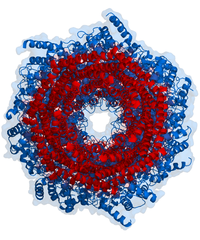
Photo from wikipedia
Plant growth and productivity depend on interactions between the metabolism of carbon and nitrogen. The sensing ability of internal carbon and nitrogen metabolites (the C/N balance) enables plants to regulate… Click to show full abstract
Plant growth and productivity depend on interactions between the metabolism of carbon and nitrogen. The sensing ability of internal carbon and nitrogen metabolites (the C/N balance) enables plants to regulate metabolism and development. In order to investigate the effects of an enhanced photosynthetic capacity on the metabolism of carbon and nitrogen in photosynthetically active tissus (source leaves), we herein generated transgenic Arabidopsis thaliana plants (ApFS) that expressed cyanobacterial fructose-1,6-/sedoheptulose-1,7-bisphosphatase in their chloroplasts. The phenotype of ApFS plants was indistinguishable from that of wild-type plants at the immature stage. However, as plants matured, the growth of ApFS plants was superior to that of wild-type plants. Starch levels were higher in ApFS plants than in wild-type plants at 2 and 5 weeks. Sucrose levels were also higher in ApFS plants than in wild-type plants, but only at 5 weeks. On the other hand, the contents of various free amino acids were lower in ApFS plants than in wild-type plants at 2 weeks, but were similar at 5 weeks. The total C/N ratio was the same in ApFS plants and wild-type plants, whereas nitrite levels increased in parallel with elevations in nitrate reductase activity at 5 weeks in ApFS plants. These results suggest that increases in the contents of photosynthetic intermediates at the early growth stage caused a temporary imbalance in the free-C/free-N ratio and, thus, the feedback inhibition of the expression of genes involved in the Calvin cycle and induction of the expression of those involved in nitrogen metabolism due to supply deficient free amino acids for maintenance of the C/N balance in source leaves of ApFS plants.
Journal Title: Journal of Plant Research
Year Published: 2017
Link to full text (if available)
Share on Social Media: Sign Up to like & get
recommendations!